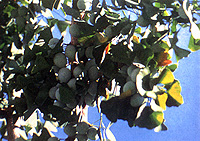Ginkgo Extracts Show Promise
By Sean Henahan, Access Excellence
 Washington, DC (October 22, 1997)- An extract of the plant Ginkgo biloba, long used in Chinese medicine, appears to provide some benefit for some patients with Alzheimer’s disease, reported clinical researchers at the American Medical Association’s 16th Annual Science Reporters Conference.
Washington, DC (October 22, 1997)- An extract of the plant Ginkgo biloba, long used in Chinese medicine, appears to provide some benefit for some patients with Alzheimer’s disease, reported clinical researchers at the American Medical Association’s 16th Annual Science Reporters Conference.
Researchers from the New York Institute for Medical Research, Tarrytown, N.Y., compared the effects of EGb 761, a particular extract of Ginkgo biloba, and and placebo in a year-long, double-blind study of 309 demented patients with mild to moderately severe cognitive impairment caused by Alzheimer disease, vascular dementia or a combination of the two.
The results indicated that EGb had a measurable effect on cognitive impairment and daily living and social behavior in patients with dementia. Although the treatment effect could not be detected by the clinician’s global impression of change, it was demonstrated through objective tests of cognitive performance and was strong enough to be noticed by caregivers.
A little more than one quarter of patients treated for at least six months with EGb achieved at least a four point improvement on the commonly used 70 point Alzheimer Disease Assessment Scale-Cognitive subscale, compared with 14 percent taking placebo. Another rating scale, the Geriatric Evaluation by Relative’s Rating Instrument (GERRI), showed improvement in daily living and social behavior of 37 percent of the patients taking EGb, compared with 23 percent taking placebo.
“Compared with the placebo group, the EGb group included twice as many patients whose cognitive performance improved and half as many whose social functioning worsened. In clinical terms, improvement on the ADAS-Cog of four points may be equivalent to a six-month delay in the progression of the disease. EGb appears to stabilize and, in an additional 20 percent of cases (vs. placebo), improve the patient’s functioning for periods of six months to one year. Regarding its safety, adverse events associated with EGb were no different from those associated with placebo,” reported Pierre L. LeBars, M.D., Ph.D.
“Although it has a reasonably modest effect, it could be meaningful to caregivers. To have a plateau for six months and be able to interact with the person when they’re still at a relatively early stage is something that many families would appreciate, I think,” Marcelle Morrison-Bogorad, an Alzheimer’s disease researcher at the National Institute on Aging at the National Institutes of Health, told the press.
Extracts from the Ginkgo biloba tree have long been used in China for diseases associated with old age. The extract of Ginkgo biloba used in this study, EGb 761, has recently been approved in Germany for the treatment of dementia.
The researchers do not know how EGb exerts its neurological effects. Ginkgo extracts contain antioxidants that may help to protect cells against oxidative damage. Oxidative damage has been seen in the brain cells of Alzheimer’s patients. Ginkgo extracts also contains compounds that act as vasodilators, increasing blood flow. They also contain substances which exert strong anti-platelet effects.
Gingko Shows Promise Home Page
Used with permission of Sean Henahan




